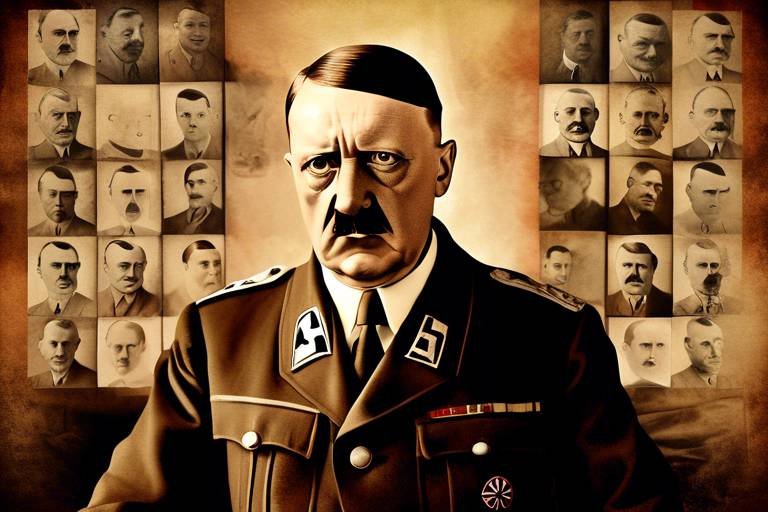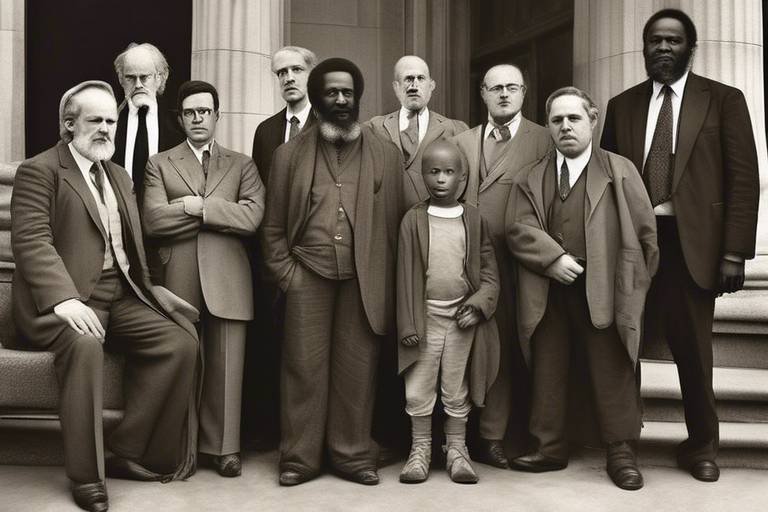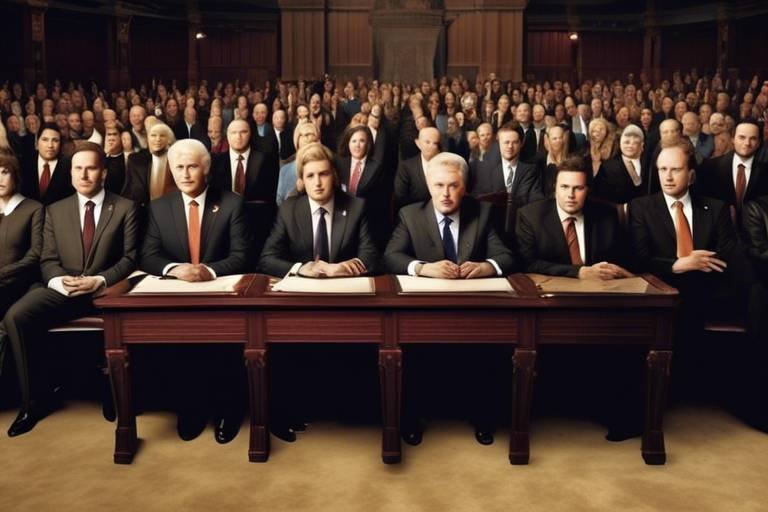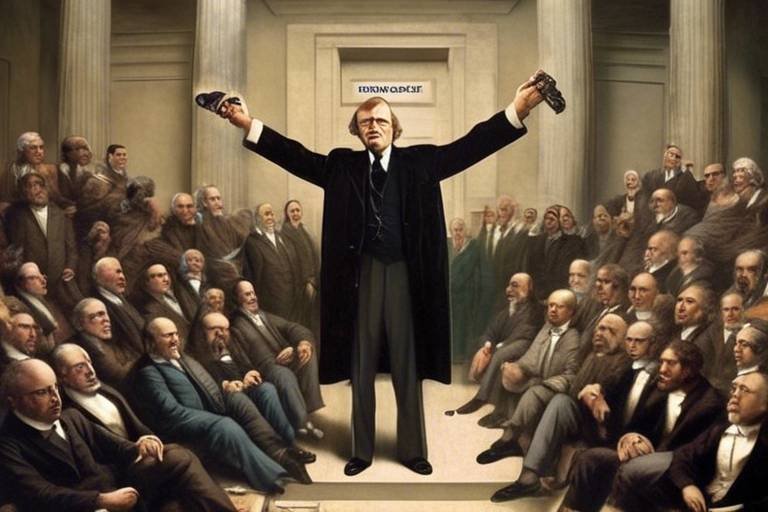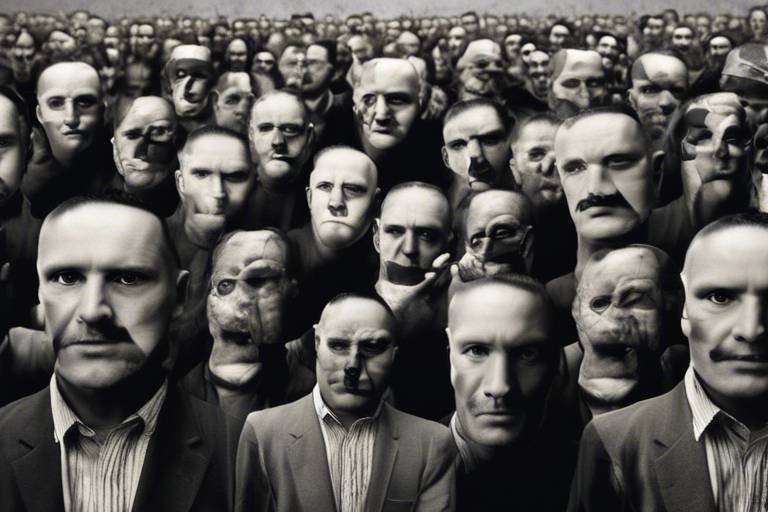The Philosophy of Hitler’s Politics
The political landscape of the 20th century was dramatically shaped by the ideologies and actions of Adolf Hitler. His regime, marked by a toxic blend of nationalism, racism, and militarism, left an indelible mark on history. But what exactly fueled Hitler's political philosophy? How did his beliefs translate into policies that not only devastated Germany but also the world at large? In this article, we will delve into the core beliefs that underpinned Hitler's strategies, exploring their origins, their implications for society, and the lessons that can be drawn from this dark chapter in history.
To understand the essence of Hitler's political beliefs, we must first look at the formative experiences that shaped him. Growing up in Austria, Hitler was exposed to a unique blend of German nationalism and anti-Semitic sentiments. However, it was his experiences during World War I that profoundly influenced his worldview. The chaos and humiliation of Germany's defeat left a lasting impression on him, fostering a deep-seated resentment towards the Treaty of Versailles, which he believed unfairly punished Germany.
Moreover, the socio-political climate of post-war Germany played a crucial role in shaping his ideology. The economic turmoil, hyperinflation, and political instability created fertile ground for extremist ideas. Hitler's ability to tap into the collective frustration of the German populace allowed him to gain traction and eventually rise to power. His ideology was not born in a vacuum; it was a response to the challenges of his time.
At the core of Hitler's political philosophy was an extreme form of nationalism that glorified the Aryan race while denigrating others. This belief in racial superiority was not just a personal conviction; it became a guiding principle for the Nazi regime. Hitler envisioned a Germany that was ethnically homogenous, free from what he termed 'undesirable' elements.
His policies were designed to promote the idea of the Aryan race as the pinnacle of human evolution, leading to systematic discrimination against Jews, Roma, and other minorities. This ideology was not merely theoretical; it became a driving force behind numerous policies and actions, including:
- Racial purity laws
- Forced sterilization programs
- Concentration camps
One of the most insidious aspects of Hitler's ideology was his use of anti-Semitism as a political tool. By painting Jews as the scapegoats for Germany's problems, he was able to unite a disillusioned populace against a common enemy. This rhetoric not only legitimized his political agenda but also fostered a culture of hatred that permeated German society.
The institutionalization of anti-Semitism reached its peak with the enactment of the Nuremberg Laws in 1935. These laws stripped Jews of their citizenship and prohibited them from marrying or having sexual relations with non-Jewish Germans. This legal framework laid the groundwork for the systematic persecution that would follow, demonstrating how ideology can morph into legislation with devastating consequences.
Hitler's regime was adept at using propaganda to shape public perception. The Nazi propaganda machine, led by figures like Joseph Goebbels, was instrumental in disseminating Hitler's ideology. Through films, posters, and rallies, the regime promoted its narrative, ensuring that the populace not only accepted but also embraced its policies. The use of propaganda created a distorted reality where dissent was silenced, and conformity was celebrated.
Hitler's belief in Lebensraum (living space) justified his aggressive expansionist policies. He argued that for Germany to thrive, it needed to acquire more territory, particularly in Eastern Europe. This militaristic approach not only led to the invasion of neighboring countries but also set the stage for World War II. Hitler's philosophy was deeply intertwined with the notion of conquest, reflecting a dangerous blend of ideology and military ambition.
The repercussions of Hitler’s political philosophy were profound, transforming German society in ways that are still felt today. Culture, education, and social norms were all affected by the pervasive ideology of the Nazi regime. The regime sought to reshape society according to its ideals, often at the expense of individual freedoms and human rights.
The education system was manipulated to instill Nazi ideology in the youth. Schools became tools for indoctrination, teaching children to embrace the regime's values and reject any form of dissent. Textbooks were revised to reflect Nazi beliefs, ensuring that future generations would be steeped in the ideology that had caused so much devastation.
Women were not exempt from Hitler's vision. The regime prescribed specific roles for women, promoting the idea of motherhood and domesticity as their primary functions. This ideology was utilized to support the regime's goals, encouraging women to bear more children to contribute to the Aryan population. The manipulation of gender roles served as another tool in the regime's quest for control.
The long-term effects of Hitler’s political philosophy are a somber reminder of the potential for ideology to lead to catastrophic outcomes. The devastation of World War II resulted in millions of deaths and widespread destruction, leaving a scar on humanity that is still healing. The moral implications of the actions taken under Hitler's regime continue to provoke reflection and discussion.
In the aftermath of the war, efforts to confront and dismantle Nazi ideology were initiated through a process known as denazification. This involved removing Nazi influence from various sectors of society, including government, education, and media. However, the challenges of this process were immense, as many individuals had internalized the regime's beliefs.
The historical lessons learned from Hitler’s politics are crucial for contemporary society. They remind us of the importance of vigilance against totalitarian ideologies, urging us to protect democratic values and human rights. Understanding the past is essential to ensuring that such atrocities are never repeated.
- What were the main influences on Hitler's ideology? Hitler's ideology was influenced by his experiences in World War I, the socio-political climate of post-war Germany, and the prevailing nationalist and anti-Semitic sentiments of the time.
- How did propaganda play a role in Hitler's regime? Propaganda was used extensively to shape public opinion, reinforce Nazi ideology, and promote acceptance of the regime's policies.
- What were the Nuremberg Laws? The Nuremberg Laws were laws enacted in 1935 that institutionalized racial discrimination against Jews, stripping them of citizenship and prohibiting intermarriage with non-Jews.
- What were the consequences of Hitler's politics? Hitler's politics led to the devastation of World War II, the Holocaust, and significant moral and ethical implications that continue to resonate today.

Origins of Hitler's Ideology
To truly understand the roots of Hitler's ideology, we must take a step back and examine the tumultuous period in which he emerged. The aftermath of World War I left Germany in shambles—economically, politically, and socially. The Treaty of Versailles, which imposed harsh reparations and territorial losses on Germany, created a breeding ground for resentment and anger. Many Germans felt humiliated and betrayed, searching for someone to blame for their misfortunes. This atmosphere of discontent was fertile ground for radical ideas to take root.
Hitler's experiences during the war profoundly shaped his worldview. Serving as a soldier, he witnessed the chaos and destruction firsthand, which fueled his belief in the necessity of a strong, unified nation. The war instilled in him a sense of nationalism that would later become a cornerstone of his political agenda. Coupled with his deep-seated feelings of racial superiority, these experiences forged a dangerous ideology that would have catastrophic consequences.
Hitler was also influenced by the socio-political climate of post-war Germany. The rise of extremist groups, including the German Workers' Party (which later evolved into the Nazi Party), provided him with a platform to voice his grievances. He capitalized on the fears of the populace, promoting an ideology that promised to restore Germany to its former glory. This restoration was not just about economic recovery; it was about creating a society that he envisioned as pure and superior.
In his early speeches, Hitler emphasized the idea of national rebirth, appealing to the emotions of the masses. He painted a picture of a Germany that was strong, proud, and racially homogeneous. This vision resonated with many who were desperate for change. The use of propaganda, another crucial element in his rise, allowed him to spread these ideas far and wide, reaching even those who might not have otherwise been inclined to listen.
Moreover, Hitler was influenced by various philosophical and political thinkers of the time. The writings of Friedrich Nietzsche, though often misinterpreted, played a role in shaping his ideas about strength and the will to power. Additionally, the concept of Social Darwinism—the belief that human societies evolve through competition—further justified his views on racial superiority and the need for expansion. These influences combined to create a potent mixture of ideology that would define the Nazi regime.
In conclusion, the origins of Hitler's ideology are deeply intertwined with the historical context of post-World War I Germany. The combination of personal experiences, societal discontent, and philosophical influences created a toxic brew that would ultimately lead to one of the darkest chapters in human history. Understanding these origins is crucial, not just for historical knowledge, but for recognizing the warning signs of similar ideologies in today's world.
- What were the main influences on Hitler's ideology? Hitler's ideology was influenced by his experiences in World War I, the socio-political climate of post-war Germany, and various philosophical thoughts, including Social Darwinism and the works of Friedrich Nietzsche.
- How did the Treaty of Versailles impact Hitler's beliefs? The Treaty of Versailles created a sense of humiliation and resentment among Germans, which Hitler exploited to rally support for his nationalist and racially charged agenda.
- What role did propaganda play in Hitler's rise to power? Propaganda was crucial in spreading Hitler's ideas and shaping public opinion, allowing him to gain widespread acceptance for his radical views.

Nationalism and Racial Superiority
The political landscape of Nazi Germany was profoundly shaped by a toxic blend of extreme nationalism and a warped sense of racial superiority. This ideology didn’t just emerge from thin air; it was a product of a society grappling with the aftermath of World War I. The Treaty of Versailles left Germany humiliated and economically crippled, fostering a fertile ground for radical ideas to take root. Hitler seized upon this discontent, promoting a vision of a resurgent Germany that would reclaim its rightful place in the world. But how did he justify this vision? By instilling a belief that the Aryan race was superior to all others, he created a narrative that positioned Germans as the rightful rulers of Europe.
Hitler's nationalism was not merely about love for one’s country; it morphed into an aggressive expansionism that sought to dominate others. This was encapsulated in the concept of Lebensraum, or "living space," which argued that the German people needed more territory to thrive. This belief was not just a call for more land; it was a rallying cry for the annihilation of those deemed inferior, particularly Jews, Slavs, and other minority groups. The idea of racial purity became an integral part of Nazi propaganda, which painted a picture of a glorious future that could only be achieved through the exclusion and elimination of those who did not fit into the Aryan ideal.
Furthermore, the Nazi regime utilized anti-Semitism as a political tool, uniting the populace against a common enemy. By portraying Jews as the source of Germany’s problems, Hitler was able to divert attention from his government’s failures and rally support for his increasingly radical policies. This scapegoating was not just a matter of rhetoric; it was a calculated strategy that allowed the regime to justify horrific actions. The Nuremberg Laws, enacted in 1935, institutionalized this discrimination, stripping Jews of their rights and segregating them from society. These laws were a manifestation of the deeply ingrained belief in racial superiority that permeated Nazi ideology.
To further entrench these ideas within the German psyche, the regime employed extensive propaganda campaigns. The media, education, and even art were harnessed to glorify the Aryan race while demonizing others. Joseph Goebbels, the Minister of Propaganda, was a master at manipulating public perception, ensuring that the narrative of racial superiority became a cornerstone of everyday life. This relentless barrage of propaganda not only shaped public opinion but also created a culture where dissent was squashed, and conformity was rewarded.
In summary, the intertwining of nationalism and racial superiority in Hitler's ideology was not an isolated phenomenon; it was a deliberate strategy that had devastating consequences. It fostered a sense of unity among Germans at the expense of countless lives. The ramifications of this ideology extended far beyond Germany's borders, leading to a catastrophic war and the horrors of the Holocaust. Understanding this dark chapter in history is crucial for recognizing the dangers of unchecked nationalism and the ideologies that can lead to such atrocities.
- What was the main ideology behind Hitler's nationalism?
Hitler's nationalism was rooted in the belief that the Aryan race was superior and that Germany needed to expand its territory to ensure the survival and prosperity of its people. - How did Hitler use propaganda to promote his ideas?
Hitler's regime used propaganda to glorify the Aryan race and demonize Jews and other minorities, shaping public opinion and ensuring widespread acceptance of Nazi policies. - What were the Nuremberg Laws?
The Nuremberg Laws were a set of regulations enacted in 1935 that institutionalized racial discrimination against Jews, stripping them of their rights and segregating them from society. - What were the consequences of Hitler's ideology?
Hitler's ideology led to the devastation of World War II and the Holocaust, resulting in the loss of millions of lives and leaving a lasting scar on human history.

Anti-Semitism as a Political Tool
Hitler’s use of anti-Semitism was not merely a reflection of personal prejudice; it was a calculated political strategy designed to consolidate power and unify the German populace against a common enemy. In the wake of World War I, Germany was reeling from defeat, economic hardship, and a sense of national humiliation. Hitler seized upon the existing anti-Jewish sentiments within society, amplifying them to create a scapegoat for the nation’s problems. By portraying Jews as the architects of Germany's misfortunes, he effectively redirected public anger away from the government and towards this marginalized group.
This manipulation of public sentiment was not accidental; it was a cornerstone of Nazi ideology. Hitler's rhetoric painted Jews as a dangerous and subhuman "other," responsible for everything from economic instability to cultural decay. Such dehumanization was crucial in justifying the regime's increasingly oppressive measures against Jewish people. The Nazi propaganda machine churned out a relentless stream of anti-Semitic messages, permeating every aspect of society—from newspapers and films to educational materials. The infamous film "The Eternal Jew" exemplified this, depicting Jewish people as vermin, thus fostering a climate of hatred and fear.
To further entrench this ideology, the Nazis organized massive rallies and public speeches that glorified Aryan identity while vilifying Jews. These events were designed to evoke a sense of unity and purpose among the German people, creating an "us versus them" mentality. Hitler’s speeches often included emotional appeals, invoking a sense of loss and betrayal that resonated deeply with audiences. By framing Jews as the enemy, he not only justified his political agenda but also built a fervent base of support among those seeking to restore Germany’s former glory.
Moreover, the Nazis implemented a series of laws that institutionalized anti-Semitic beliefs, culminating in the Nuremberg Laws of 1935. These laws stripped Jews of their citizenship and legal rights, effectively dehumanizing them in the eyes of the law. The systemic nature of this discrimination was a direct result of the political utility of anti-Semitism, as it allowed the regime to consolidate power by marginalizing those deemed "undesirable." The Nuremberg Laws served as both a political tool and a means of social engineering, reshaping the fabric of German society to align with Nazi ideals.
In conclusion, anti-Semitism was more than just a part of Hitler's ideology; it was a strategic instrument used to galvanize support, distract from governmental failures, and facilitate the regime’s broader goals of domination and control. By understanding this manipulation of hatred, we can better grasp the chilling effectiveness of propaganda in shaping societal attitudes and the dire consequences that can follow when prejudice is weaponized for political gain.
- What role did propaganda play in promoting anti-Semitism in Nazi Germany?
Propaganda was crucial in normalizing anti-Semitic beliefs, using various media to depict Jews as threats to society and to justify discriminatory laws and actions. - How did Hitler's anti-Semitic policies impact Jewish communities?
These policies led to widespread persecution, resulting in the loss of rights, economic ruin, and ultimately, the Holocaust, which decimated Jewish communities across Europe. - Can we see parallels in contemporary politics regarding the use of scapegoating?
Yes, the use of scapegoating in politics can still be observed today, where marginalized groups are often blamed for broader societal issues, highlighting the need for vigilance against such tactics.

The Nuremberg Laws
The Nuremberg Laws, enacted in 1935, were a pivotal moment in the institutionalization of racial discrimination in Nazi Germany. These laws were not merely bureaucratic measures; they represented a profound shift in societal norms and legal frameworks that targeted Jews and other minorities. The laws aimed to define who was considered a Jew and to strip them of their rights, effectively dehumanizing an entire population. This was a critical step in Hitler's broader agenda of racial purity and national rejuvenation, as it laid the groundwork for the systemic persecution that would follow.
At the heart of the Nuremberg Laws were two primary pieces of legislation: the Law for the Protection of German Blood and German Honor, and the Reich Citizenship Law. The former prohibited marriages and sexual relations between Jews and non-Jewish Germans, while the latter stripped Jews of their German citizenship. This legal framework not only marginalized Jews but also legitimized their exclusion from society. Imagine waking up one day to find that your identity and rights had been erased by law—this was the grim reality for countless individuals.
These laws were reflective of the broader ideology of the Nazi regime, which sought to create a racially homogeneous society. The Nuremberg Laws served as a tool for propaganda, reinforcing the notion that Jews were a threat to the German way of life. The regime portrayed Jews as the scapegoats for Germany's economic woes and social unrest following World War I, effectively uniting the populace against a common enemy. By institutionalizing such discriminatory practices, the Nazis were able to manipulate public sentiment and garner support for increasingly violent measures against Jews.
To illustrate the impact of the Nuremberg Laws, consider the following table that summarizes the key components and their implications:
| Law | Description | Impact |
|---|---|---|
| Law for the Protection of German Blood and German Honor | Prohibited marriages and sexual relations between Jews and non-Jewish Germans. | Furthered the segregation and isolation of Jews from German society. |
| Reich Citizenship Law | Stripped Jews of their German citizenship. | Dehumanized Jews and rendered them stateless, removing legal protections. |
The consequences of the Nuremberg Laws were profound and far-reaching. They not only facilitated the immediate oppression of Jews but also set the stage for the Holocaust. By normalizing discrimination through legal means, the Nazis were able to create a culture of fear and compliance. The laws were a chilling reminder of how political ideologies can manifest in the most horrific ways when left unchecked. Understanding the Nuremberg Laws is crucial for grasping the full scope of Hitler's political philosophy and its devastating impact on society.
- What were the Nuremberg Laws? The Nuremberg Laws were a set of laws enacted in 1935 that institutionalized racial discrimination against Jews in Nazi Germany.
- What was the purpose of the Nuremberg Laws? The laws aimed to define Jewish identity, strip Jews of their rights, and promote the Nazi ideology of racial purity.
- How did the Nuremberg Laws affect Jewish people? The laws marginalized Jews, prohibited their marriages with non-Jewish Germans, and stripped them of their citizenship, leading to widespread persecution.
- What was the long-term impact of the Nuremberg Laws? The Nuremberg Laws laid the groundwork for the systemic persecution of Jews during the Holocaust and demonstrated how legal frameworks can facilitate human rights abuses.

Propaganda and Public Perception
Propaganda played a pivotal role in shaping public perception during Hitler's regime, acting as a powerful tool to manipulate the masses and solidify the Nazi ideology. The regime understood that controlling the narrative was essential for maintaining power, and they expertly crafted messages that resonated with the emotions and fears of the German people. By presenting a distorted reality, they were able to foster a sense of unity among the populace while simultaneously creating a common enemy.
One of the most significant aspects of Nazi propaganda was its ability to simplify complex issues into easily digestible messages. For instance, the portrayal of Jews as the root of Germany's problems was a central theme. This narrative not only scapegoated an entire population but also diverted attention from the regime's failures. The Nazis utilized various media forms—posters, films, radio broadcasts, and rallies—to disseminate their ideology, ensuring that their messages reached every corner of society.
To illustrate the effectiveness of Nazi propaganda, consider the following table that outlines the key methods employed:
| Method | Description |
|---|---|
| Posters | Colorful and striking visuals that conveyed powerful messages, often featuring slogans that promoted Aryan ideals. |
| Film | Movies like "The Eternal Jew" depicted Jews in a negative light, reinforcing stereotypes and justifying persecution. |
| Rallies | Mass gatherings, such as the Nuremberg Rallies, showcased the strength of the Nazi party and created a sense of belonging and excitement among attendees. |
| Radio | Accessible to the masses, radio broadcasts spread propaganda messages into homes, ensuring a constant stream of Nazi ideology. |
Moreover, the regime's propaganda machine was relentless. It not only glorified Hitler as a messianic figure but also instilled a sense of duty among citizens to support the state. The infamous slogan "Ein Volk, ein Reich, ein Führer" (One People, One Empire, One Leader) encapsulated the essence of their message, promoting a singular identity that marginalized any dissenting voices.
Interestingly, the Nazis also employed a tactic known as the "Big Lie," which suggested that if a lie is repeated often enough, it will be accepted as truth. This principle underpinned much of their messaging, allowing them to perpetuate falsehoods about their enemies and the state of the nation. As a result, many Germans were swayed by the propaganda, leading to widespread acceptance of policies that would have been unthinkable in a more informed society.
In conclusion, propaganda was not just a byproduct of Hitler's regime; it was a fundamental component of their strategy to control the narrative and manipulate public perception. By understanding the emotional landscape of the German populace and exploiting it through various media, the Nazis were able to maintain a grip on power that had devastating consequences for millions. As we reflect on this dark chapter in history, it serves as a stark reminder of the power of propaganda and the importance of critical thinking in the face of persuasive messaging.
- What role did propaganda play in Nazi Germany? Propaganda was essential for shaping public perception, promoting Nazi ideology, and creating a common enemy, particularly against the Jews.
- How did the Nazis use media for propaganda? The Nazis utilized various media forms, including posters, films, and radio broadcasts, to disseminate their messages widely and effectively.
- What was the "Big Lie" tactic? The "Big Lie" tactic involved repeating a falsehood often enough that it would be accepted as truth by the public, effectively manipulating perceptions.

Militarism and Expansionism
Hitler's political philosophy was deeply intertwined with a fervent sense of militarism and a relentless desire for expansionism. This ideology was not just a mere aspect of his rule but rather a core principle that dictated the actions and policies of the Nazi regime. The concept of Lebensraum, or "living space," became a rallying cry for Hitler and his followers, justifying the aggressive territorial ambitions that would ultimately plunge Europe into chaos. But what did this really mean for Germany and the world at large?
To understand the impact of militarism and expansionism, we must first recognize the context in which these ideas flourished. After the humiliation of World War I and the harsh conditions imposed by the Treaty of Versailles, many Germans felt a profound sense of resentment and a desire for revenge. Hitler tapped into this sentiment, promoting the notion that Germany needed to reclaim its rightful place in the world through military might and territorial expansion. This was not merely about acquiring land; it was about restoring national pride and asserting dominance over perceived enemies.
The militaristic approach was evident in various aspects of Nazi policy. The regime invested heavily in rearmament, ignoring the restrictions imposed by the Treaty of Versailles. This military buildup was not just for defense; it was a clear signal of intent to expand German territory. The Nazis glorified the military in propaganda, portraying soldiers as heroes and the military as the backbone of the nation. This glorification served to further entrench militarism in the German psyche, making it a fundamental aspect of national identity.
Hitler's expansionist policies were not limited to rhetoric; they manifested in concrete actions. The annexation of Austria in 1938 and the subsequent invasion of Czechoslovakia were early indicators of his intentions. These actions were framed as reunifications of German-speaking peoples, but they were also strategic moves aimed at increasing Germany's power and influence in Europe. The Nazi regime justified these expansions as necessary for the survival and prosperity of the German nation.
The culmination of this militaristic and expansionist ideology was the outbreak of World War II. Hitler's invasion of Poland in 1939 marked the beginning of a conflict that would engulf the globe. The war was characterized by brutal military tactics and a complete disregard for human life, as the Nazi regime sought to implement its vision of a Greater Germany. This vision included not just the conquest of territory but also the systematic extermination of those deemed "undesirable," a horrific consequence of the extreme nationalism that fueled Hitler's ambitions.
In summary, the intertwining of militarism and expansionism in Hitler's politics was a driving force behind the catastrophic events of the 20th century. It reshaped not only Germany but also the entire world, leading to immense suffering and loss. Understanding this aspect of Hitler's ideology is crucial for recognizing the dangers of unchecked nationalism and militaristic fervor in any society.
- What was Lebensraum, and why was it important to Hitler?
Lebensraum, or "living space," was a key concept in Nazi ideology that justified territorial expansion. Hitler believed that for Germany to thrive, it needed to acquire more land, particularly in Eastern Europe, to provide resources and space for its growing population. - How did militarism influence Nazi policies?
Militarism was central to Nazi ideology, promoting the military as the embodiment of national strength. This led to significant investments in rearmament and ultimately justified aggressive actions like the invasions of neighboring countries. - What were the consequences of Hitler's expansionist policies?
Hitler's expansionist policies directly contributed to the outbreak of World War II, resulting in widespread devastation, loss of life, and the eventual downfall of the Nazi regime. The war also led to significant geopolitical changes in Europe and beyond.

Impact on German Society
The impact of Hitler’s political philosophy on German society was profound and far-reaching, reshaping the very fabric of everyday life. Under Nazi rule, the nation underwent a radical transformation that affected not just governance, but also culture, education, and social norms. Imagine living in a society where your identity is dictated by your race, where loyalty to the state supersedes personal freedoms, and where propaganda infiltrates every aspect of life. This was the reality for millions of Germans during the Nazi era.
One of the most significant changes was in the realm of education. The Nazi regime recognized the importance of indoctrinating the youth, believing that the future of Germany depended on shaping the minds of its children. Schools became tools of propaganda, where the curriculum was rewritten to glorify the Aryan race and vilify others. Subjects such as history and biology were manipulated to serve the regime's ideology. For instance, children were taught that their worth was determined by their racial background, fostering a sense of superiority among Aryan students while dehumanizing Jews and other minorities.
Furthermore, the role of women in Nazi ideology was meticulously crafted to support the regime's goals. Women were encouraged to embrace traditional roles as mothers and homemakers, embodying the ideal of the "Aryan mother." This was not merely a societal expectation; it was a political strategy aimed at increasing the birth rate of Aryan children to ensure the perpetuation of the race. The Nazi slogan "Kinder, Küche, Kirche" (Children, Kitchen, Church) encapsulated this ideology, reinforcing the notion that a woman's place was in the home, nurturing the future generation.
The regime also sought to cultivate a culture of conformity and loyalty. Public events, rallies, and parades were meticulously orchestrated to create a sense of unity and purpose among the populace. The infamous Nuremberg Rallies, for example, were grand spectacles designed to showcase the power of the Nazi party and instill a sense of pride in German identity. These events served not only as propaganda tools but also as a means to suppress dissent and promote a collective mentality that discouraged individual thought.
In addition to education and cultural manipulation, the Nazi regime imposed strict social norms that dictated acceptable behavior. The expectation to conform was pervasive, and those who deviated from the norm faced severe consequences. This climate of fear stifled creativity and dissent, leading to a society where people were more concerned about survival than about questioning the regime's actions. The pervasive atmosphere of mistrust and betrayal transformed interpersonal relationships, as neighbors became wary of one another, fearing that anyone could be an informant.
Despite the oppressive environment, resistance movements did emerge, albeit in small numbers. Groups like the White Rose, composed mainly of university students, bravely challenged the regime's ideology, distributing pamphlets that called for passive resistance and urging the German people to awaken from their complacency. However, such acts of defiance were often met with brutal repression, highlighting the risks associated with opposing the Nazi state.
The legacy of Hitler's impact on German society is complex. While the regime succeeded in uniting many Germans under a banner of nationalism, it did so at an unimaginable cost. The social fabric of the nation was irrevocably altered, leaving scars that would take generations to heal. The lessons learned from this dark chapter in history continue to resonate today, reminding us of the importance of safeguarding democratic values and human rights.
- What was the main goal of Nazi education? The primary goal was to indoctrinate youth with Nazi ideology, emphasizing Aryan superiority and loyalty to the state.
- How did the Nazi regime view women? Women were primarily seen as bearers of Aryan children, and their roles were limited to motherhood and homemaking.
- What were the Nuremberg Rallies? These were large propaganda events designed to showcase Nazi power and foster a sense of unity among Germans.
- Was there any resistance to the Nazi regime? Yes, although it was minimal, groups like the White Rose bravely challenged the regime's ideology through pamphlets and protests.

Education and Indoctrination
The Nazi regime recognized the profound impact of education on shaping societal beliefs and values. By controlling the educational system, Hitler aimed to embed his ideology deep within the minds of the younger generation. Schools became breeding grounds for propaganda, where teachers were required to align their teachings with Nazi principles. This manipulation of education was not merely an afterthought; it was a calculated strategy to ensure that the future generation would grow up steeped in the ideology of the regime.
One of the most significant aspects of this indoctrination was the alteration of the curriculum. Subjects like history and biology were twisted to support the narrative of racial superiority and the glorification of the Aryan race. For instance, history lessons emphasized the supposed victimization of Germans and the need for national revival, while biology classes taught students about the "scientific" basis for racial purity. The idea was to create a sense of identity and purpose among the youth, instilling in them the belief that they were part of a superior race destined to dominate.
Furthermore, the regime implemented youth organizations such as the Hitler Youth, which played a crucial role in the indoctrination process. These organizations provided a platform for young boys and girls to engage in activities that reinforced Nazi values, such as physical fitness, military training, and loyalty to Hitler. The aim was to cultivate a sense of camaraderie and commitment to the party from a young age. Participation in these groups was not optional; it was a rite of passage that every child was expected to undertake.
To illustrate the extent of this indoctrination, consider the following table that outlines the key components of the Nazi education system:
| Component | Description |
|---|---|
| Curriculum Changes | Subjects were revised to promote Nazi ideology, emphasizing racial purity and German nationalism. |
| Teacher Training | Educators were required to undergo training to ensure their teachings aligned with Nazi principles. |
| Youth Organizations | Groups like the Hitler Youth indoctrinated children through activities that emphasized loyalty and physical prowess. |
| Propaganda Materials | Textbooks and literature were heavily censored to eliminate any dissenting views and promote the regime's narrative. |
In essence, education under the Nazi regime was a tool of indoctrination, designed to create a generation of loyal followers who would carry the torch of Hitler's vision into the future. The implications of this systematic brainwashing were catastrophic, as it not only shaped individual beliefs but also reinforced a societal structure that enabled the regime's oppressive policies. The consequences of such an education system are still felt today, as we reflect on the importance of critical thinking and the need to question the narratives presented to us.
- What was the purpose of education in Nazi Germany?
Education was used as a tool for indoctrination to instill Nazi ideology in the youth and create loyal supporters of the regime. - How did the curriculum change under the Nazi regime?
The curriculum was altered to emphasize racial superiority, nationalism, and loyalty to Hitler, with subjects tailored to support these themes. - What role did youth organizations play in education?
Youth organizations like the Hitler Youth provided a platform for indoctrination, promoting physical fitness, military training, and allegiance to the Nazi party. - What are the long-term effects of this indoctrination?
The long-term effects include a generation shaped by extremist beliefs, which contributed to the societal acceptance of oppressive policies and actions during the Nazi era.
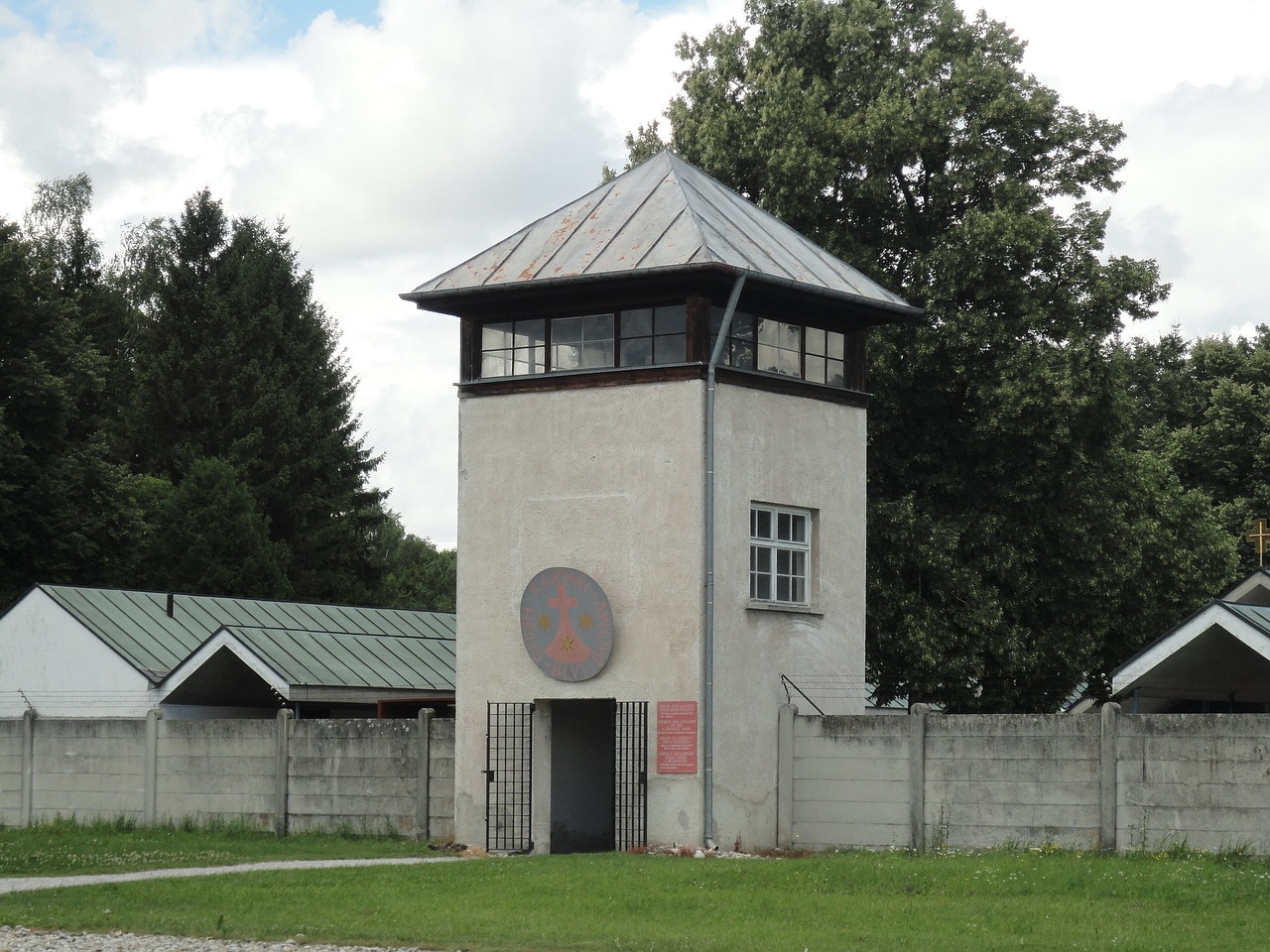
Role of Women in Nazi Ideology
The role of women in Nazi ideology was intricately woven into the fabric of the regime's vision for society. The Nazis championed a very specific image of femininity, which was rooted in traditional values and centered around the concepts of motherhood, marriage, and domesticity. Women were primarily viewed as the bearers of the Aryan race, tasked with producing and raising children who would grow up to be loyal citizens of the Third Reich. This was encapsulated in the regime’s slogan: "Kinder, Küche, Kirche" (Children, Kitchen, Church). This phrase underscored the expectation that women should focus on family and home, rather than pursuing careers or engaging in public life.
To facilitate this vision, the Nazi regime implemented a series of policies aimed at promoting traditional gender roles. For instance, women were encouraged to leave their jobs to make way for men, especially during the economic recovery of the 1930s. The regime offered financial incentives, such as the Mother's Cross, which rewarded women for having multiple children. This policy not only aimed to increase the Aryan population but also reinforced the notion that a woman's primary duty was to her family and the state.
However, the reality for women during the Nazi era was more complex. While the regime idealized the role of women as homemakers, it also required their active participation in various aspects of Nazi life. For example, women were recruited into organizations like the League of German Girls (Bund Deutscher Mädel), which aimed to indoctrinate young girls into Nazi ideology. This organization emphasized physical fitness, loyalty to the Führer, and the importance of motherhood, effectively marrying the ideals of femininity with the goals of the state.
As the war progressed, the need for women in the workforce became increasingly evident. With many men conscripted into military service, women were called upon to fill roles in factories, farms, and even in auxiliary military positions. This shift not only contradicted the earlier Nazi ideals but also highlighted the regime's pragmatic approach to gender roles in times of crisis. Women became essential to the war effort, demonstrating their capabilities beyond the home, yet they were still expected to return to traditional roles once the conflict ended.
The impact of Nazi ideology on women was profound and long-lasting. The regime's strict gender norms and policies left a legacy that affected post-war society in Germany. Many women struggled to reconcile their wartime experiences with the expectations placed upon them in the aftermath. The push for traditional roles created an internal conflict that would take decades to resolve as women sought greater autonomy and equality in society.
In summary, the role of women in Nazi ideology was a paradoxical blend of exaltation and restriction. While they were glorified as the bearers of the Aryan race, their contributions outside the home were often minimized or overlooked. The Nazi regime's policies created a rigid framework that sought to control women's lives, yet the realities of war forced a reevaluation of these roles. This complex legacy of gender during the Nazi era continues to be a topic of discussion and analysis in contemporary society.
- What was the primary role of women in Nazi Germany? Women were primarily viewed as mothers and homemakers, responsible for raising Aryan children and maintaining the household.
- Did women work during the Nazi regime? Yes, women were encouraged to work in various sectors during the war, especially as men were conscripted into military service.
- How did Nazi ideology affect women's rights? The regime imposed strict gender roles that limited women's rights and opportunities, reinforcing traditional expectations of femininity.
- What was the significance of the Mother's Cross? The Mother's Cross was an award given to women for bearing multiple children, emphasizing the regime's focus on increasing the Aryan population.
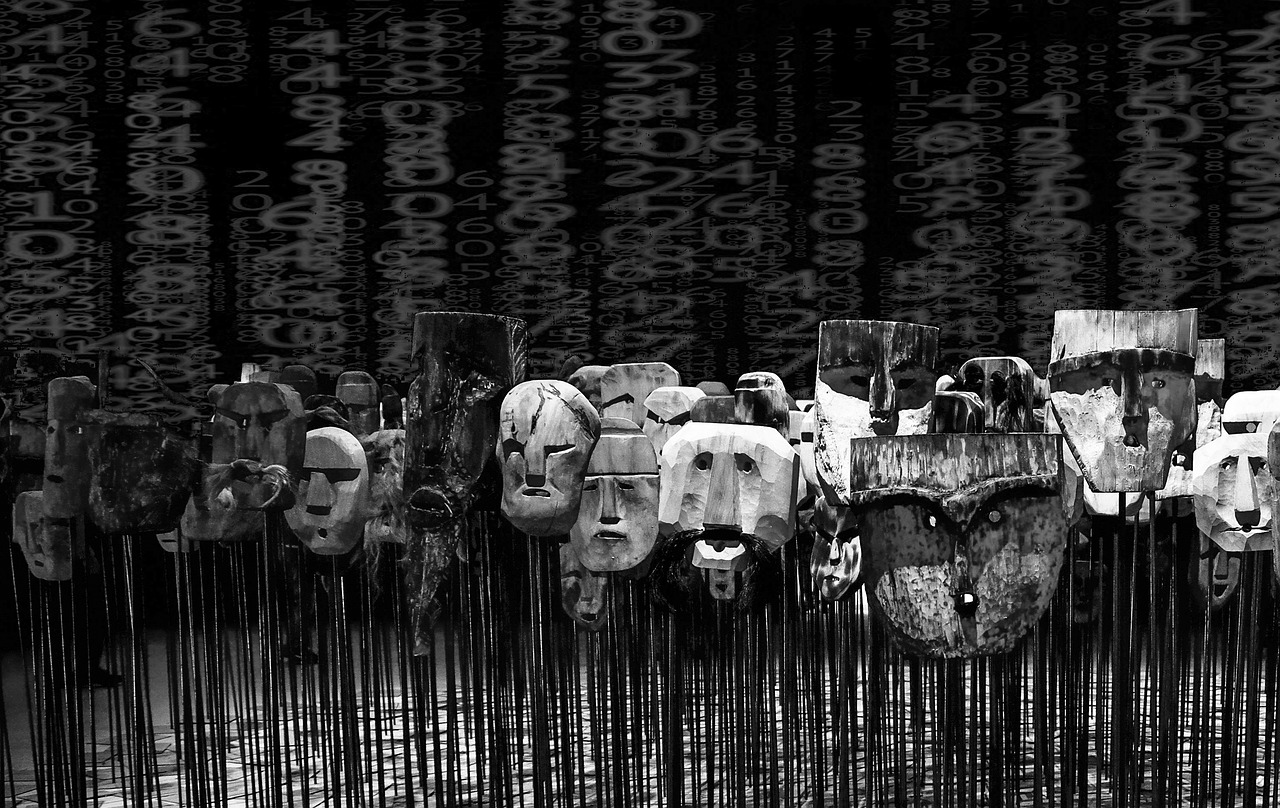
Consequences of Hitler’s Politics
The political philosophy of Adolf Hitler had profound and far-reaching consequences, not only for Germany but for the entire world. The devastation wrought by his regime during World War II is a stark reminder of the dangers posed by totalitarian ideologies. The impact of Hitler's politics can be analyzed through various lenses, including the immediate human toll, the destruction of societies, and the long-term moral implications that continue to resonate today.
One of the most significant consequences of Hitler's politics was the catastrophic loss of life. Estimates suggest that approximately 70 to 85 million people perished as a direct or indirect result of the war, including the systematic genocide of six million Jews during the Holocaust. This act of mass murder not only decimated the Jewish population but also targeted various other groups, including the Romani people, disabled individuals, and political dissidents. The ramifications of such atrocities are still felt in contemporary society, as they serve as a chilling reminder of the depths of human cruelty.
Moreover, the war led to extensive destruction across Europe. Cities were reduced to rubble, economies collapsed, and millions were displaced. The rebuilding efforts post-war were monumental, but they also highlighted the need for a new political and social order. The devastation prompted a re-evaluation of international relations and the establishment of bodies such as the United Nations, which aimed to prevent future conflicts of such magnitude. The geopolitical landscape was forever altered, leading to the Cold War and the division of Europe into East and West.
In addition to the immediate consequences, the moral implications of Hitler's regime have sparked ongoing debates and reflections. The sheer scale of the atrocities committed under his leadership raises critical questions about humanity's capacity for evil and the responsibilities of individuals and societies in preventing such occurrences. It also underscores the importance of education and remembrance, ensuring that the lessons of history are not forgotten. The phrase "Never Again" has become a rallying cry for those advocating against genocide and totalitarianism, emphasizing the necessity of vigilance in safeguarding human rights.
To comprehend the full extent of Hitler's political consequences, we can examine the following table that summarizes key impacts:
| Impact | Description |
|---|---|
| Loss of Life | Approximately 70 to 85 million deaths, including the Holocaust. |
| Destruction of Infrastructure | Widespread devastation of cities and economies across Europe. |
| Displacement of Populations | Millions forced to flee their homes, leading to refugee crises. |
| Moral Reflection | Ongoing debates about humanity, morality, and the prevention of future atrocities. |
| Geopolitical Changes | Formation of international bodies like the UN and the onset of the Cold War. |
Finally, the legacy of Hitler's politics serves as a cautionary tale for future generations. It is crucial to remain vigilant against the resurgence of totalitarian ideologies, which can manifest in various forms. The importance of fostering a society that values democracy, human rights, and tolerance cannot be overstated. As we reflect on the past, we must also commit ourselves to ensuring that history does not repeat itself.
- What were the immediate consequences of Hitler's policies? The immediate consequences included the outbreak of World War II, widespread destruction, and the loss of millions of lives, particularly through the Holocaust.
- How did Hitler's regime affect global politics? Hitler's regime led to significant changes in global politics, including the establishment of the United Nations and the division of Europe during the Cold War.
- What lessons can we learn from Hitler's politics? The key lessons include the importance of vigilance against totalitarianism, the need for education about human rights, and the necessity of remembrance to prevent future atrocities.
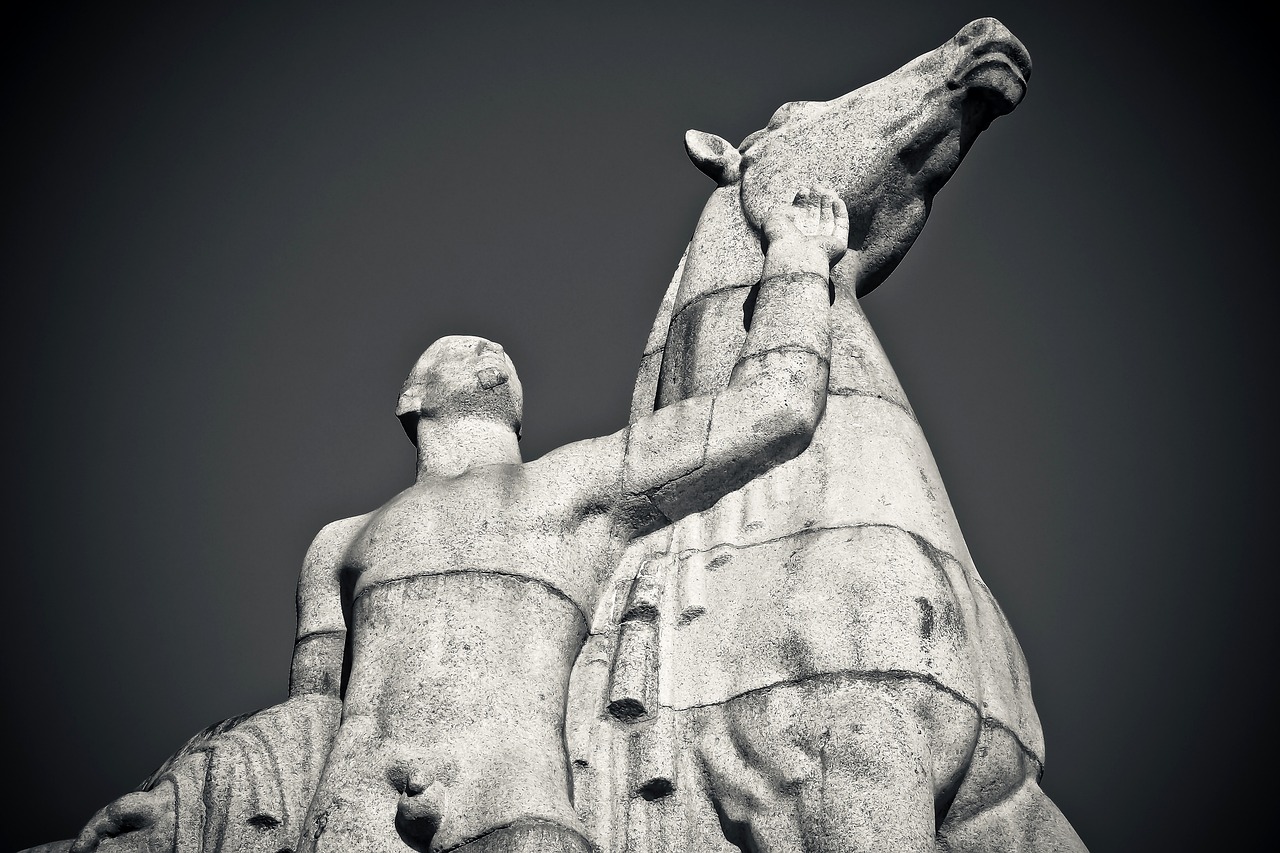
Post-War Reflection and Denazification
After the dust settled from the catastrophic events of World War II, the world was left grappling with the remnants of Hitler's brutal regime. The aftermath was not just a physical reconstruction of war-torn Europe, but also a profound moral reckoning with the ideologies that had fueled such destruction. How could a society that once embraced Hitler's radical ideas begin to heal and move forward? This question became central to the process of denazification, an initiative aimed at purging German society of Nazi influence and ideology.
Denazification was not simply about punishing those directly involved in the atrocities; it was a comprehensive effort to re-educate the populace and dismantle the institutional frameworks that supported the Nazi regime. The Allies, particularly the United States, Britain, and France, took on the daunting task of transforming Germany from a nation steeped in totalitarianism to one that could embrace democracy and human rights. The challenges were immense, as many Germans were reluctant to acknowledge their complicity in the horrors of the Holocaust and the war.
One of the first steps in this process was the establishment of the denazification tribunals. These courts aimed to assess the involvement of individuals in Nazi activities, ranging from high-ranking officials to ordinary citizens. The criteria for judgment often included:
- Membership in the Nazi Party
- Participation in Nazi organizations
- Involvement in war crimes or crimes against humanity
However, the denazification process faced criticism and complications. Many former Nazis managed to evade accountability, while others were simply re-integrated into society due to a lack of evidence or the need for skilled professionals to help rebuild the country. This led to a sense of disillusionment among those who believed in the necessity of a thorough cleansing of Nazi ideologies.
Another critical aspect of denazification was the reformation of the education system. Schools became battlegrounds for ideological warfare, as educators sought to instill democratic values and a sense of responsibility in the younger generations. Textbooks were rewritten, and curricula were overhauled to emphasize critical thinking and historical accuracy. The goal was to ensure that the mistakes of the past would not be repeated, fostering a culture of vigilance against totalitarian ideologies.
Despite the challenges, the denazification process also sparked significant reflection within German society. Many citizens began to confront their own biases and the seductive nature of extremist ideologies. This introspection was crucial for healing, as it allowed individuals to recognize the dangers of blind allegiance to authority and the importance of safeguarding democracy. The legacy of this reflection is still evident today, as Germany remains committed to confronting its past while promoting tolerance and understanding.
In conclusion, the post-war reflection and denazification process were essential in addressing the trauma and moral failures of the Nazi era. While the journey was fraught with difficulties, it laid the groundwork for a more democratic and self-aware German society. The lessons learned from this tumultuous period continue to resonate, serving as a reminder of the need for constant vigilance against the resurgence of totalitarian ideologies.
- What was the primary goal of denazification? The main goal was to remove Nazi influences from German society and re-educate the populace to embrace democratic values.
- Who was held accountable during the denazification process? Individuals involved in Nazi activities, including party members and those who participated in war crimes, were subject to evaluation and potential punishment.
- How did education play a role in denazification? The education system was reformed to promote democratic values and critical thinking, ensuring future generations would learn from the past.
- Were there any challenges to the denazification process? Yes, many former Nazis evaded accountability, and there was a general reluctance among some Germans to confront their past.

Lessons for Future Generations
As we reflect on the harrowing legacy of Adolf Hitler's politics, it becomes increasingly clear that the lessons learned are not just historical footnotes, but vital reminders for our contemporary society. The rise and fall of the Nazi regime serve as a stark warning against the dangers of unchecked power, totalitarian ideologies, and the manipulation of public sentiment. It's essential to understand that history is not merely a collection of dates and events; it is a narrative that shapes our present and future.
One of the most critical lessons is the importance of vigilance in safeguarding democracy. The Nazi regime did not emerge overnight; it was a gradual process fueled by economic despair, social unrest, and the exploitation of nationalistic fervor. Today, we must remain alert to the signs of similar movements that seek to undermine democratic values. This means actively participating in the political process, educating ourselves and others about our rights, and standing up against hate speech and discrimination in all its forms.
Moreover, the catastrophic consequences of Hitler's policies highlight the need for a robust educational framework that promotes critical thinking and historical awareness. Schools should not shy away from discussing uncomfortable topics, such as genocide and oppression. Instead, they should encourage students to question, analyze, and understand the root causes of such atrocities. By fostering a culture of inquiry, we can cultivate a generation that is less susceptible to the allure of extremist ideologies.
In addition, the role of media literacy cannot be overstated. During the Nazi era, propaganda was a powerful tool that distorted reality and manipulated public perception. In our digital age, misinformation spreads like wildfire through social media platforms, making it imperative for individuals to discern fact from fiction. Teaching media literacy equips people with the skills to critically evaluate sources, understand bias, and recognize propaganda, ultimately empowering them to make informed decisions.
Lastly, we must acknowledge the significance of empathy and understanding in our interactions with others. The dehumanization of entire groups was a cornerstone of Nazi ideology, leading to unimaginable suffering. By fostering a culture of empathy, we can combat prejudice and build bridges between diverse communities. Engaging in open dialogues, sharing personal stories, and promoting inclusivity can help us appreciate our shared humanity, reducing the likelihood of future atrocities.
In conclusion, the lessons from Hitler’s politics are profound and multifaceted. By remaining vigilant, promoting education, enhancing media literacy, and fostering empathy, we can ensure that the horrors of the past are never repeated. It is our collective responsibility to honor the memory of those who suffered and to build a more just and equitable world for future generations.
- What are the key lessons we can learn from Hitler's politics?
Key lessons include the importance of vigilance in protecting democracy, the need for critical education, the role of media literacy, and the value of empathy in society. - How can we safeguard against totalitarian ideologies today?
We can safeguard against totalitarian ideologies by participating in the political process, educating ourselves and others, and standing against hate and discrimination. - Why is media literacy important in today's society?
Media literacy is crucial because it helps individuals discern misinformation and propaganda, empowering them to make informed choices in a digital age. - How can empathy help prevent future atrocities?
Empathy fosters understanding and connection among diverse communities, reducing prejudice and the likelihood of dehumanization.
Frequently Asked Questions
- What were the main influences on Hitler's ideology?
Hitler's ideology was shaped by a combination of factors, including his experiences during World War I, the socio-political turmoil in post-war Germany, and the prevailing nationalist sentiments of the time. These elements fostered a belief in racial superiority and a deep-seated animosity towards perceived enemies, particularly the Jewish population.
- How did nationalism play a role in Hitler's politics?
Nationalism was a cornerstone of Hitler's political philosophy. He believed in the superiority of the Aryan race and sought to unite the German people under this ideology. This extreme nationalism justified aggressive policies, including expansionism and militarism, as he aimed to restore Germany's power and territory lost after World War I.
- What was the purpose of the Nuremberg Laws?
The Nuremberg Laws were designed to institutionalize racial discrimination. They defined who was considered a Jew and stripped Jews of their citizenship rights, laying the groundwork for widespread persecution. These laws were a critical step in the Nazi regime's effort to dehumanize and isolate the Jewish community.
- How did propaganda influence public perception during the Nazi regime?
Propaganda played a crucial role in shaping public opinion and reinforcing Hitler’s ideology. The regime used various media forms, including films, posters, and rallies, to disseminate its messages. This constant barrage of propaganda helped normalize extreme beliefs and policies, ensuring widespread acceptance among the populace.
- What impact did Hitler's regime have on education?
The Nazi regime manipulated the education system to indoctrinate the youth with its ideology. Textbooks were rewritten, and curricula were designed to promote loyalty to Hitler and the state, while also instilling anti-Semitic beliefs. This manipulation aimed to shape future generations' views and ensure the continuity of Nazi ideology.
- What were the prescribed roles of women in Nazi society?
In Nazi ideology, women were primarily viewed as mothers and homemakers, responsible for raising Aryan children. The regime promoted the idea that women should focus on family and reproduction to ensure the growth of the Aryan population, sidelining their roles in the workforce and public life.
- What were the long-term consequences of Hitler's political philosophy?
The consequences of Hitler’s politics were devastating, culminating in World War II and the Holocaust. The moral implications of his regime's actions continue to resonate today, serving as a stark reminder of the dangers of totalitarian ideologies and the importance of safeguarding democratic values.
- What efforts were made to confront Nazi ideology after the war?
After the war, Germany undertook a denazification process aimed at dismantling Nazi ideology. This involved removing former Nazis from positions of power, re-educating the populace, and addressing the atrocities committed during the regime. However, this process faced significant challenges, including public resistance and the complexities of reconciling with a painful past.
- What lessons can be learned from Hitler’s politics for future generations?
One of the key lessons from Hitler’s politics is the necessity of vigilance against totalitarian ideologies. It highlights the importance of promoting tolerance, understanding, and democratic values to prevent the rise of similar regimes in the future. Awareness and education about history are crucial in ensuring that such atrocities are not repeated.

